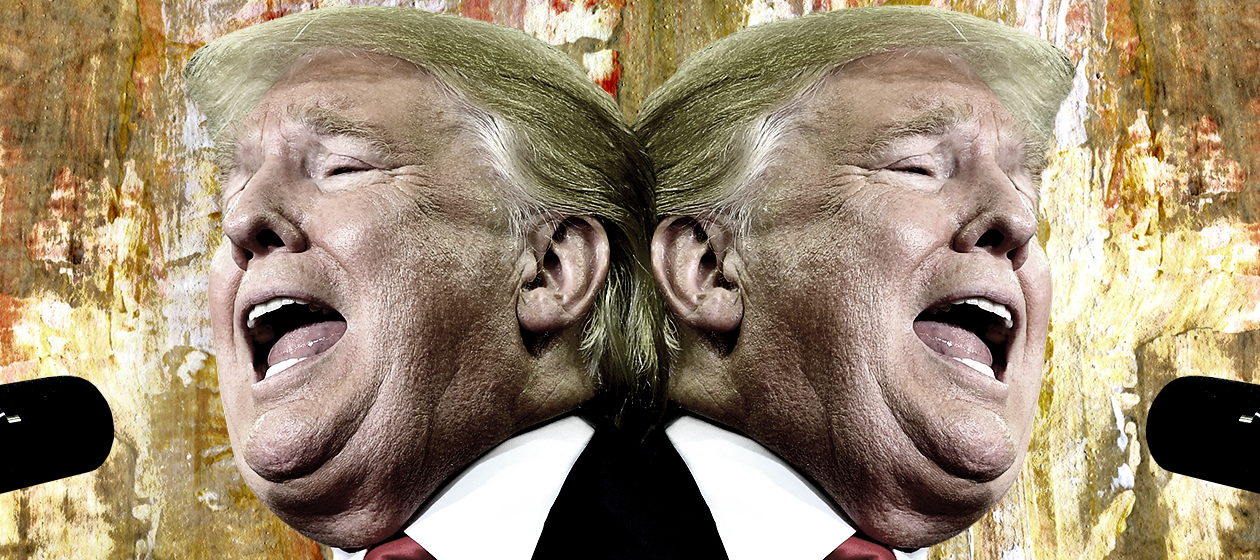The Trump administration's latest self-contradictory trolling
Trump reportedly might sanction Chinese officials for detaining Muslims. That's … ironic.


A free daily email with the biggest news stories of the day – and the best features from TheWeek.com
You are now subscribed
Your newsletter sign-up was successful
As the world continues to devour the "we're all going to die"-inducing revelations of Bob Woodward's Fear, it's worth pausing to consider the slower-motion disaster of the Trump administration: Our nation is losing its moral authority.
According to a New York Times report, administration officials are weighing sanctions against "Chinese senior officials and companies to punish Beijing's detention of hundreds of thousands of ethnic Uighurs and other minority Muslims in large internment camps."
About which:
The Week
Escape your echo chamber. Get the facts behind the news, plus analysis from multiple perspectives.

Sign up for The Week's Free Newsletters
From our morning news briefing to a weekly Good News Newsletter, get the best of The Week delivered directly to your inbox.
From our morning news briefing to a weekly Good News Newsletter, get the best of The Week delivered directly to your inbox.
Human rights advocates and legal scholars say the mass detentions in the northwest region of Xinjiang are the worst collective human rights abuse in China in decades. Since taking power in 2012, President Xi Jinping has steered China on a hard authoritarian course, which includes increased repression of large ethnic groups in western China, notably the Uighurs and Tibetans. [The New York Times]
In normal times, we would expect the U.S. government to seek to punish such abuses.
Alas, we do not live in normal times. To quote the cliche we tell our toddlers, when we point a finger abroad, there are now four fingers pointing back at us.
Under the Trump administration, the U.S. government has specifically targeted Muslims with its infamous (and Supreme Court-blessed) travel ban. And it has ordered the forcible separation of children from their migrant parents, confined them to, well, detention camps, and created hundreds of orphans in the process.
Am I suggesting a moral equivalence between the United States and China?
A free daily email with the biggest news stories of the day – and the best features from TheWeek.com
No, I am not. To be sure: The Trump administration is not trying to indoctrinate Muslims or force them to denounce their religion. And the best thing that can be said of its policy toward migrant families that cross the southern border is that it's small-fry compared to the scale of China's detention of ethnic and religious minorities.
However: No matter what you think about the United Nations human rights panel in Geneva and its thorny relations with Israel, alarms should go off when it declares that behavior by America's government "may amount to torture." And, after all, many of the same U.N. human rights officers are helping to spotlight the case against Chinese abuses now.
Look, our nation had a divisive debate about a different form of torture in the recent past. The point is not to rehash that. The problem now is — to quote that anonymous op-ed-writing administration official — the president of the United States is "amoral." Everyone in the world knows this, and, when they're honest, his most obnoxious defenders admire him for it.
To delve into the details of the Times report is to be reminded that there's a significant tranche of Republican "normies" who populate the Trump administration. The fact that we're even considering these sanctions is a refreshing blast from the blast.
The discussions over the mass detentions in Xinjiang highlight American efforts on issues that diverge from the president's priorities. Mr. Trump has rarely made statements criticizing foreign governments for human rights abuses or anti-liberal policies, and in fact has praised authoritarian leaders, including Mr. Xi.The Trump administration has confronted China over economic issues — the two countries are in the middle of a prolonged trade war — but has said little about rampant abuses by its security forces. [The New York Times]
And there, the game is given away. If we've learned anything about the inner-workings of the Trump administration over the last 18 months, it's that the most skilled White House officials and outside pleaders know how to manipulate him to achieve their own exogenous goals. The administration officials and congressional allies who truly care about curbing Chinese human rights abuses no doubt framed the imposition of sanctions as a way to squeeze the Xi regime on trade and, perhaps, ongoing negotiations over North Korea.
To use a basketball analogy, a couple of human rights points are scored off a geopolitical bank shot.
That's the best we can expect right now in this indefinite period of moral decline.
Scott Galupo is a freelance writer living in Virginia. In addition to The Week, he blogs for U.S. News and reviews live music for The Washington Post. He was formerly a senior contributor to the American Conservative and staff writer for The Washington Times. He was also an aide to Rep. John Boehner. He lives with his wife and two children and writes about politics to support his guitar habit.
-
 The Week Unwrapped: Do the Freemasons have too much sway in the police force?
The Week Unwrapped: Do the Freemasons have too much sway in the police force?Podcast Plus, what does the growing popularity of prediction markets mean for the future? And why are UK film and TV workers struggling?
-
 Properties of the week: pretty thatched cottages
Properties of the week: pretty thatched cottagesThe Week Recommends Featuring homes in West Sussex, Dorset and Suffolk
-
 The week’s best photos
The week’s best photosIn Pictures An explosive meal, a carnival of joy, and more
-
 Epstein files topple law CEO, roil UK government
Epstein files topple law CEO, roil UK governmentSpeed Read Peter Mandelson, Britain’s former ambassador to the US, is caught up in the scandal
-
 Iran and US prepare to meet after skirmishes
Iran and US prepare to meet after skirmishesSpeed Read The incident comes amid heightened tensions in the Middle East
-
 Israel retrieves final hostage’s body from Gaza
Israel retrieves final hostage’s body from GazaSpeed Read The 24-year-old police officer was killed during the initial Hamas attack
-
 China’s Xi targets top general in growing purge
China’s Xi targets top general in growing purgeSpeed Read Zhang Youxia is being investigated over ‘grave violations’ of the law
-
 Panama and Canada are negotiating over a crucial copper mine
Panama and Canada are negotiating over a crucial copper mineIn the Spotlight Panama is set to make a final decision on the mine this summer
-
 Why Greenland’s natural resources are nearly impossible to mine
Why Greenland’s natural resources are nearly impossible to mineThe Explainer The country’s natural landscape makes the task extremely difficult
-
 Iran cuts internet as protests escalate
Iran cuts internet as protests escalateSpeed Reada Government buildings across the country have been set on fire
-
 US nabs ‘shadow’ tanker claimed by Russia
US nabs ‘shadow’ tanker claimed by RussiaSpeed Read The ship was one of two vessels seized by the US military
